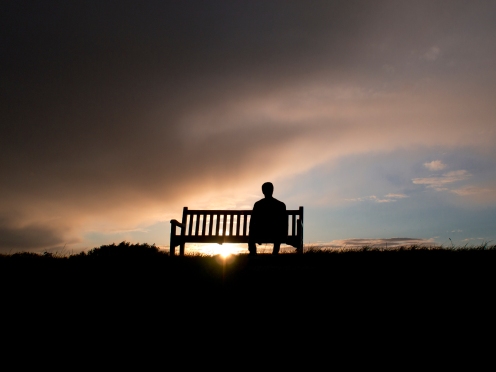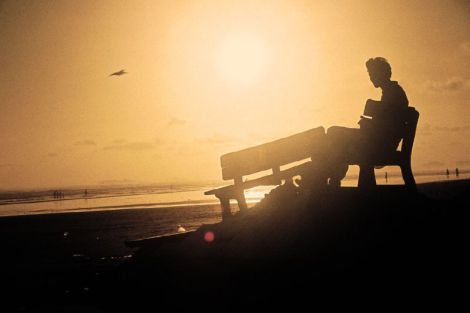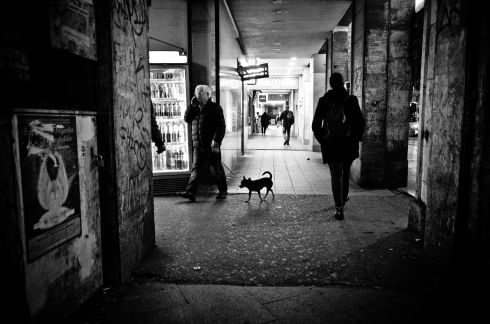Guilaine Kinouani on losing one’s home without leaving
When I was a 20-year-old undergraduate student or so; I lost my home when it was repossessed. My husband and I had fallen on hard times because I got pregnant and;  very quickly, I could not work due to threatened miscarriages and then, premature labour.
very quickly, I could not work due to threatened miscarriages and then, premature labour.
And so, on the day we were expelled, we waited outside for the council to decide whether a) I was homeless b) I had made myself ‘intentionally homeless’ and, c) whether I was entitled to a home. Please take a few moments to imagine this; you are standing outside of what used to be your home; with the few pieces of furniture you owned when you were 20 scattered on the pavement, and; you have in your arms a baby; born as predicted prematurely. You are trying to make sure they are warm. And you are waiting…
What kind of things might be going through your head?
I will tell you what went through mine. Images of benefit scroungers and bloody immigrants. Images of the irresponsible black mothers; of welfare queens and other misogynoir tropes. Then I started to wonder whether the scepticism of the council was warranted. Whether I had in fact chosen not to carry my baby to term, whether I was to blame and; whether I was deserving of a home. I was waiting for someone to take me home but not only in the material sense. Home was also what I knew; what was real was home. In this moment, I have never felt so lost, exposed, ashamed, powerless and vulnerable in my sense of sanity.
As a therapist, I have been doing socio-politically and feminist-informed work exclusively with women and non-binary people of colour for a few years. My practice is centred on the lived experience of marginalisation and; I have recognised glimpses of my experience in the stories of subtle racism others shared with me, so I naturally started to make the connection.
To explain, we need to start off with some definitions. Firstly, homelessness, I take it to mean the condition of being without a home or a permanent dwelling. Or the experience of feeling left without safe, secure and adequate housing.
Secondly, epistemic injustice. Epistemic simply refers to things that are to do with knowledge; knowing and understanding the world. Miranda Fricker proposes that epistemic injustice occurs when we are wronged in our capacity to know or to contribute to knowledge because of prejudice.
The final concept is ontological insecurity. Ontological insecurity refers to a person’s lack of security in relation their “being” in the world. It has been defined as a state of dread which stems from being unable to give meaning to events in our lives, or when we struggle with being sure about the reality or existence of things, others and ourselves.
Our capacity to know is dependent on our capacity to have a home
Both knowing and home provide:
– a sense of safety and stability in time and space
– a frame, physical, symbolic, cognitive
– boundaries; between us and the world, inside and outside, the known and the unknown
– a secure base and a secure base is necessary to explore the world
– a grounding to anchor us
Epistemic homelessness, like physical homelessness, requires unequal power. In the same way that it is usually those with more social power who can displace and expel us from our physical dwellings or decide if we are entitled to be housed, power is central to epistemic homelessness.
I am sure many of us would have experienced this in the context of subtle violence. Some might refer to such experience as micro-aggression. Perhaps as a brown or black body you have been praised on your commend English, perhaps the white person behind you gets served before you, perhaps upon entering a white space you experienced THE gaze and it was said without being said that your body is trespassing. That you did not belong. And you felt hit in your guts. And you know!
As soon as you feel the violence, particularly if you try to name it, it is denied. Indeed, you may become the problem.
You may be told that you have a chip on your shoulder and; if you show any sign of offence, distress or anger, you will duly be invited to respond more ‘appropriately’. It is  at this point you may start to doubt yourself and your confidence in your capacity to know; becomes eroded. You may wonder; is it me? Am I the problem, am I fabricating the problem? Am I overreacting? I am being oversensitive? Am I going mad? The process of losing anchor has begun.
at this point you may start to doubt yourself and your confidence in your capacity to know; becomes eroded. You may wonder; is it me? Am I the problem, am I fabricating the problem? Am I overreacting? I am being oversensitive? Am I going mad? The process of losing anchor has begun.
All the stories of women of colour I have heard in therapy had epistemic homelessness as a theme. Whether they were stories of work contributions being overlooked or stories of invisibled pain. Stories of bodies being consumed or policed obsessively but always ever so subtly; or stories of being forced into stereotypes and; stories of struggling to break free.
Each story was a story of denial and of invalidation. Each one of these stories was a story of normalisation of the said denial and invalidation. Subtle racism cannot be easily seen and so of course, it does not take place. But you cannot see what you are unwilling to see, you cannot see what you have been programmed not to see. Yet, I have seen the distress and I have experienced it. And it seems others have too…
Listening to the audience
In preparation for my TEDx Talk on the subject, I ran a few polls on Twitter. The first tested whether people of colour found covert or overt racism more challenging. 549 people answered. Covert racism was about 7 times more challenging. The second poll answered by 336 people; revealed that 95% were disbelieved, mocked or ignored when speaking of their experience of subtle racism. The final poll had 659 participants and asked about the impact of such responses. Feeling as though one was going mad was experienced by 36% of respondents, followed by pain and distress reported by 32% of pollsters. Other responses included feelings of rage, of helplessness, of exhaustion, of shame, of disbelief, of being gaslighted… All results were (very) statistically significant; meaning the probability that such results arose by chance alone is almost null.
One participant, Pauline Mayers said of her experience that it was like ‘Feeling like a  stranger in a familiar land with no anchor and no support’. Her words gave me Goosebumps. Reflecting on my experience and that of the women who have entrusted me with theirs, it was the image of an anchor which repeatedly came to mind. My definition was already centred around it. So, I would propose that epistemic homelessness is the subjective experience of losing anchor in a situation of epistemic injustice. That it is an embodied displacement from one’s intimate truth base. You could say it is the mediating variable between our capacity to know (epistemic confidence) and ontological insecurity.
stranger in a familiar land with no anchor and no support’. Her words gave me Goosebumps. Reflecting on my experience and that of the women who have entrusted me with theirs, it was the image of an anchor which repeatedly came to mind. My definition was already centred around it. So, I would propose that epistemic homelessness is the subjective experience of losing anchor in a situation of epistemic injustice. That it is an embodied displacement from one’s intimate truth base. You could say it is the mediating variable between our capacity to know (epistemic confidence) and ontological insecurity.
Trusting our lived experience as resistance
So, where do we go from here? The evidence is quite clear that subtle racism is at least as distressing as other more overt classes of racism. I want to leave some strategies that WOC and other marginalised people may attempt; to help themselves with their experience of epistemic homelessness.
Trust your experience. As marginalised people we are socialised to distrust ourselves, our knowledge, our competence and; to devalue our bodies and minds; all of which can undermine our epistemic confidence and make it easier for us to experience epistemic homelessness. Trusting our lived experience is a vital act of resistance so; get to know your truth signals; trust them! They will (more likely than not) point you in the right direction…the direction of home.
When your experience is being denied, take a socio-political helicopter view of the situation and ask yourself: not only what is happening in the here and now; but also, what is being reproduced socio-politically, who is the purported knower, where does power rest. Resist the temptation to individualise or internalise
Remember that you do not need to make your existence and your lived reality subject to agreement, debate or approval. Certainly not from those whose very sense of self is rooted in the erasure of the violence they enact. The ultimate power is the power to define. We have that power. Let’s define our experiences… for ourselves. Let’s define the world.
If you are experiencing epistemic homelessness or even ontological insecurity; please seek support and refuge from those who will honour your home and help you find your way back.

If you enjoyed this, and want more like it, then please consider making a donation, it can be anything from £2 and takes no time at all. Or give what you can afford from £2 per month and become an MD member.
Guilaine Kinouani is a French woman of African descent, a writer, an equality consultant and therapist currently working toward a Doctorate in Clinical Psychology. She runs a private therapy practice focused on self-care and, on the experience of marginalisation, oppression and Otherness. She blogs at racereflections.co.uk on the interface of psychology, mental health, social justice and oppression. Tweet her @KGuilaine
Images:J Stimp, Murtaza Imran Ali & Nick Page
All work published on MD is the intellectual property of its creators, and requires permission to be republished. Contact us if you have any questions.

Reblogged this on Blessing Kgosi e tsile Kgasa.
LikeLike